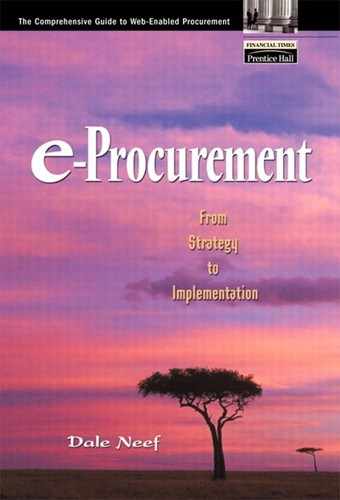Application Service Providers
ASPs are third-party service organizations that provide hosted applications that service either a one-to-many buyer model or a many-to-many industry trading community. With the advantage of maintaining all the software, catalogs, and store files on their own servers, they provide an opportunity for companies—both buyers and sellers—to participate in electronic trading communities without having to buy, install, or maintain their own software. They provide essential e-procurement services, such as catalog content aggregation and maintenance, electronic requisitioning, contract development, order and delivery management, and electronic payment, and can process transactions using various forms of EDI, XML, and other communications protocols. All of this is provided for a license fee, a subscription, or for various forms of usage charges.
ASPs came about in the past few years because, as we have seen, the early e-procurement solutions based on the buyer-managed model required significant time, effort, and resources by both buyers and sellers in order to maintain catalogs, systems, and multiple forms of communications protocols. There was a ready market for third-parties that could provide those services as core competency and remove that burden from the buyers and sellers, who were more interested in the business transaction itself than in maintaining catalogs or systems support.
Although they have had some success with the largest companies, their appeal, at least in these first formative years, has been particularly to small and mid-sized companies, which had neither the internal content management and IT resources nor the cash to buy, implement, and maintain complex and expensive e-procurement applications internally. ASPs provide companies with a cost-effective method for buying into a scaleable solution that they might not normally be able to afford.
However, when it became obvious that there was a significant market for this type of service (see Figure 6.6), others began to move into the third-party hosting arena, differentiating themselves by offering an increasing number of valuable business services to accompany the basic service of the buyer-seller portal site. Sometimes known as Enterprise Asset Management (EAM), not only did these service providers offer catalog maintenance and basic order and payment transactions services, but they also now provide various types of supply chain management, inventory replenishment, directory services and routing, transportation, CRM, order tracking services, and even fulfillment insurance. Some even provide integration with travel services and 401(k) processing.
Figure 6.6. Intermediation: B2B e-commerce, percent of total. (Source: Forrester Research as printed in “Seller Beware,” The Economist, March 4, 2000.)

A good example of software platforms themselves providing these services can be seen with Intelisys Electronic Commerce (now Metiom) and its support of the Autolink.com e-market. Because many of the smaller auto suppliers that want to participate have little IT or content management experience, Intelisys built, and as Metiom, now manages the site, maintaining both the database and server, and providing catalogs, management tools, and links to other industry suppliers. A similar service is provided by Essential Markets.com, which offers a hosted service that helps small suppliers to convert their product information into XML formats, and then places those supplier details on the Internet, including links to e-marketplaces.
Similarly, M2MEport.com, which is targeted to small and medium-sized manufacturers, provides not only an e-market portal, but also a consultative “Collaboration Center,” where their specialists work with subscribers in the design of customized products. They have even gone so far as to provide a variety of education offerings—including a distance learning program—designed to help manufacturers with procurement-related issues. Others, like Grainger.com, provide access to important technical support information and material safety data sheets for products sold through their OrderZone.com site.
Recognizing the potential for ASP outsourcing, and as a further twist to this convoluted marketplace, Clarus, Microsoft, and Cisco Systems have agreed to collaborate with a selected group of ASPs to provide them with hosted services that are designed for use by ASPs, and that incorporate ASP-specific tools that will make it easier for these ASPs to deliver e-procurement services on an outsourced basis to their customers. This reflects the high level of competition in this marketplace, and the fact that in order to survive, ASPs have been forced to seek out multiple revenue streams, including leasing applications and even building portals themselves.
